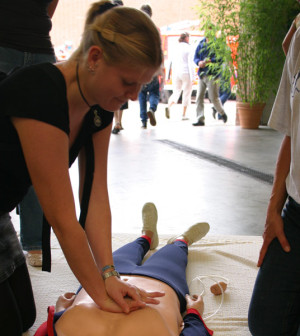- Stigma, Shame Hit Many Gay Men Affected by Mpox Outbreak
- Calories, Not Meal Timing, Key to Weight Loss: Study
- Dietary Changes May Beat Meds in Treating IBS
- Screen Pregnant Women for Syphilis, Ob-Gyn Group Advises
- Even With Weight Gain, Quitting Smoking in Pregnancy Still Best for Health
- A-Fib Is Strong Precursor to Heart Failure
- One Neurological Factor Keeps Black, Hispanic Patients From Alzheimer’s Clinical Trials
- Managing Blood Sugar After Stroke Could Be Key to Outcomes
- Dozens of COVID Virus Mutations Arose in Man With Longest Known Case
- Blood Test Might Someday Diagnose Early MS
Study Questions Safety of Common Anesthesia Drug


More concern about the safety of a common anesthetic has been raised in a new study.
Patients who received the anesthesia drug etomidate during surgery might be at increased risk for cardiovascular problems or death, according to the study, which was published in the December issue of the journal Anesthesia & Analgesia.
An accompanying editorial in the journal said the findings add to growing concerns about the use of the drug.
The study compared about 2,100 patients who received etomidate and about 5,200 patients who received another intravenous anesthetic called propofol. All of the patients in the study underwent surgery that didn’t involve the heart.
Compared to those who received propofol, patients who received etomidate had a significantly higher risk of death within 30 days after surgery, according to a journal news release. The risk was 6.5 percent in the etomidate group and 2.5 percent in the propofol group, said study leader Dr. Ryu Komatsu, of the Cleveland Clinic in Ohio.
The patients in the etomidate group also had a 50 percent higher risk of major cardiovascular problems than those in the propofol group, according to the study.
Although the researchers found a higher risk of death and cardiac problems among patients who received etomidate compared to those who received propofol, the study did not prove a cause-and-effect relationship.
The findings are “striking and troubling,” but the study is not the first to raise safety concerns over etomidate, Dr. Matthieu Legrand and Dr. Benoit Plaud, of Paris-Diderot University, in France, said in an accompanying journal editorial.
“There is accumulating evidence for an association between mortality and etomidate use, both in critically ill patients and now in [non-critically ill] patients undergoing noncardiac surgery,” they said.
Etomidate has only short-lasting effects, and it’s not clear how it could affect patients several weeks after surgery, Legrand and Plaud said. Large-scale studies are needed to determine the safety of etomidate. Until then, it might be wise to use other anesthesia drugs, they suggested.
More information
The U.S. National Library of Medicine has more about anesthesia.
Source: HealthDay
Copyright © 2024 HealthDay. All rights reserved.










